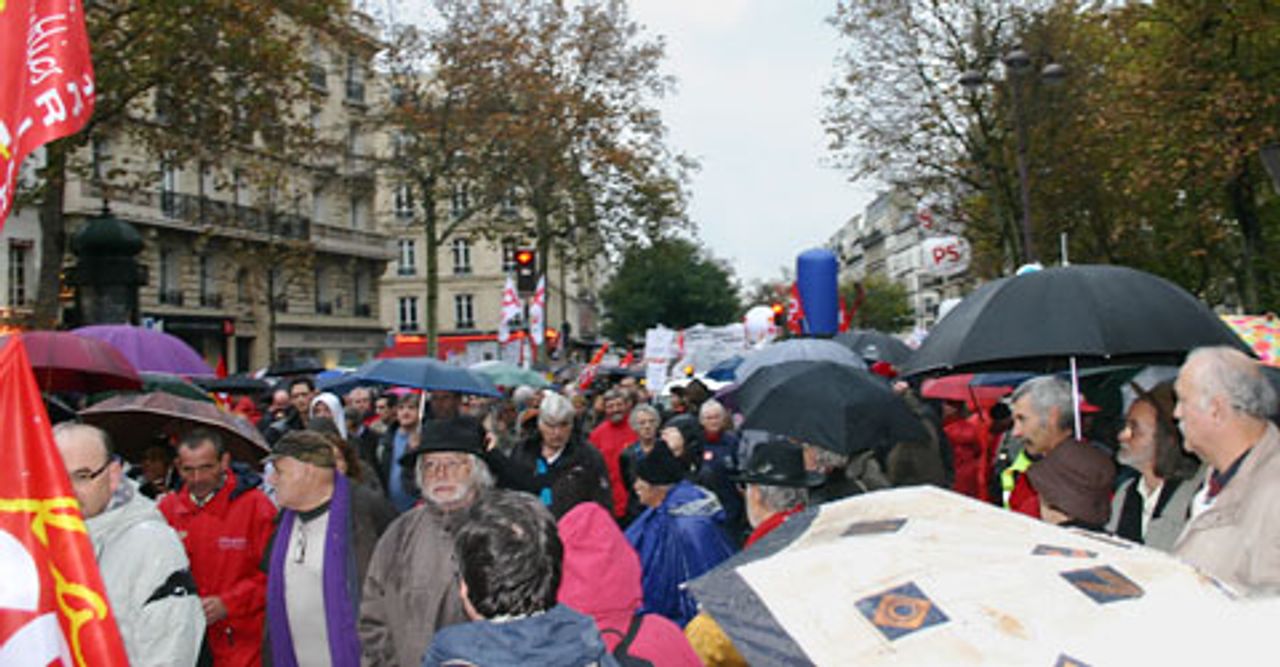 A section of the Paris demonstration
A section of the Paris demonstrationOver 1 million people marched Saturday in the eighth national day of action against President Nicolas Sarkozy’s pension cuts.
The unions estimated that on a previous day of action, October 28, 2 million participated, while police put the figure at 560,000. On Saturday, the unions’ estimate was 1.2 million, while police estimated 375,000.
The reduced participation does not signify any increase in support for Sarkozy’s deeply unpopular pension-cutting legislation. It reveals, rather, growing disillusionment in the tactics and politics of the all-trade-union alliance (Intersyndicale) and its political backers, notably the Socialist Party (PS) and its allies, and the defeat of last month’s oil strike.
This determination to fight the austerity drive by European capital, backed by the International Monetary Fund (IMF), finds expression throughout Europe. There was a 100,000-strong demonstration in Lisbon on the same day. This protest was in preparation for a national strike on November 24 against cuts in government workers’ wages of up to 10 percent, the capping of social benefits and a rise in the sales tax.
Sunday’s regional elections in Greece have been designated by the social-democratic government of George Papandreou as a referendum on his austerity drive involving, amongst other things, wage cuts of 30 percent. Mass abstentions are forecast, as workers and youth turn away from Papandreou’s right-wing agenda.
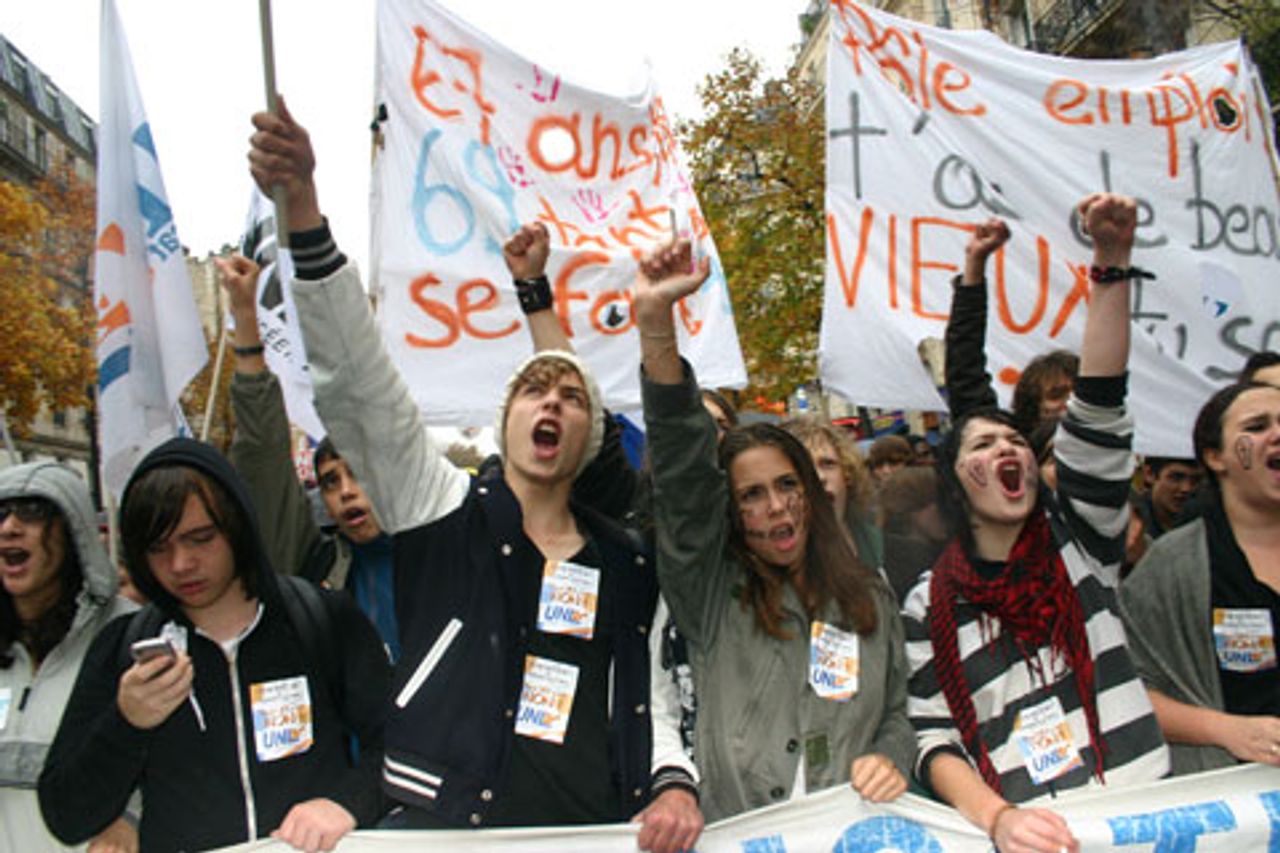 Students in Paris
Students in ParisThe unions and the “left” parties are betraying the movement against Sarkozy’s cuts in France. At the very moment when strategic sections of the working class—the railway workers and particularly those in the refineries and at the oil terminals in Fos and Le Havre—had taken hold of the economy, the trade unions, led by the CGT, began to assist the government in shutting down their strikes and blockades.
When the government forced strikers back to work, under the threat of five-year prison sentences, and sent in CRS riot police on October 27 to clear the occupations and blockades of the refineries and fuel depots, the unions ordered the dispersal of the blockades, mass pickets and occupations. They organised no mass action in support of these workers and made no attempt to provide funds for strikers feeling the pinch after the loss of up to a month’s wages.
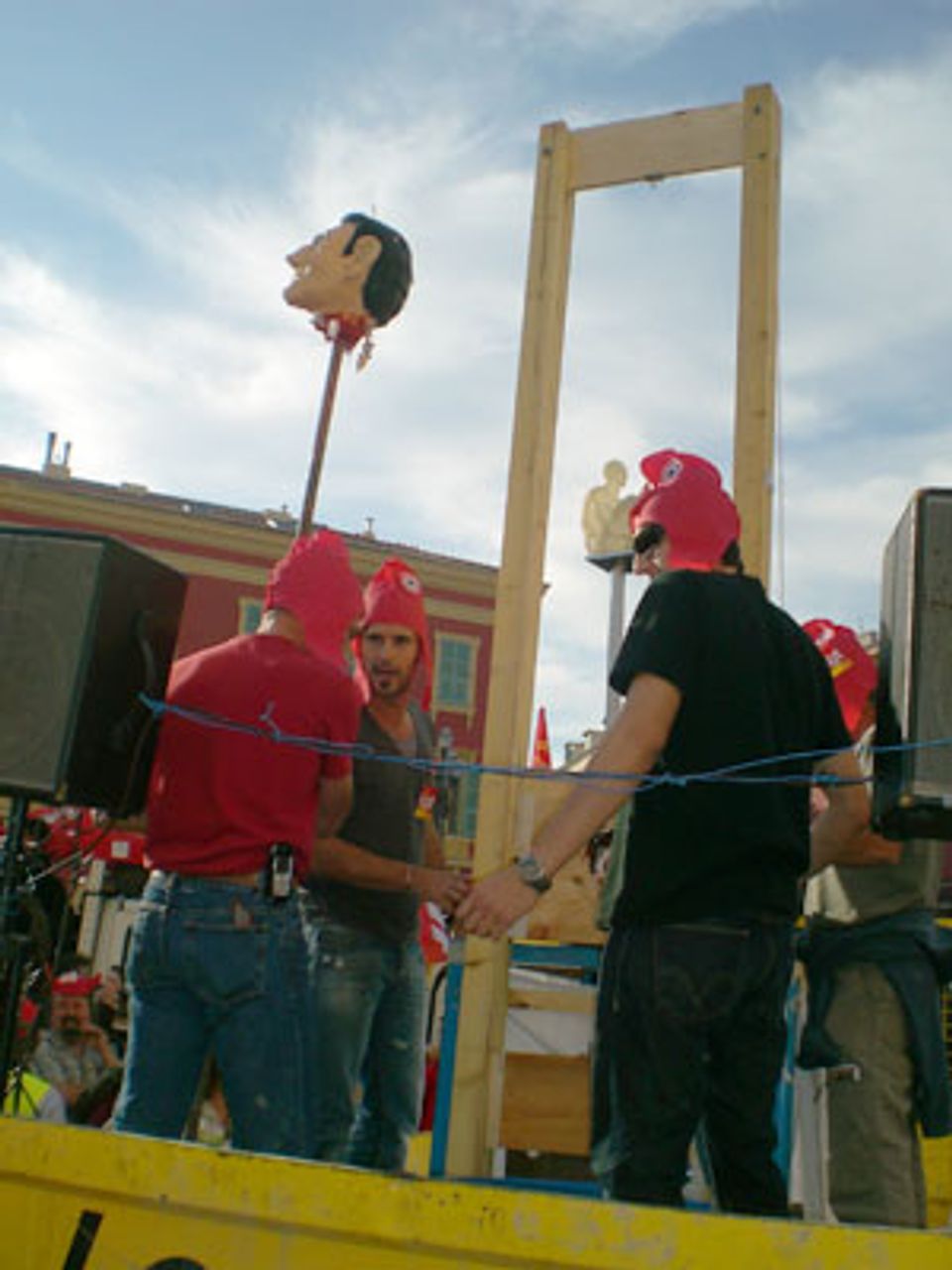 A mock trial of Sarkozy in Nice
A mock trial of Sarkozy in NiceThey refused to call a general strike to break the strikers’ isolation, because this would have meant a political confrontation with the government, posing its very survival. Therefore the unions betrayed the fight against the pensions legislation.
The age of retirement will now be extended from 60 to 62, and the age when pension rights can be claimed without major financial penalties from 65 to 67. This represents a significant loss in the quality of life of the working class and the expectations of the youth, who fear an extended working life of job insecurity ending in an old age of poverty.
The fact that these losses cannot be recouped by pressure from the streets, or negotiations between the unions and the government, must now be faced. Only the bringing down of the government and its replacement by a workers’ government built from the mass mobilisation of workers in a political general strike, independent of the unions and their political allies, will achieve this.
The Socialist Party (PS)-aligned French Democratic Confederation of Labour (CFDT) is clearly expressing its will to end the protests and to accept that, with the legislation now passed in parliament, the trade unions should go on to the next business, namely negotiations on wages and social benefits with the employers and the government on how to maintain the profitability and competitiveness of French big business.
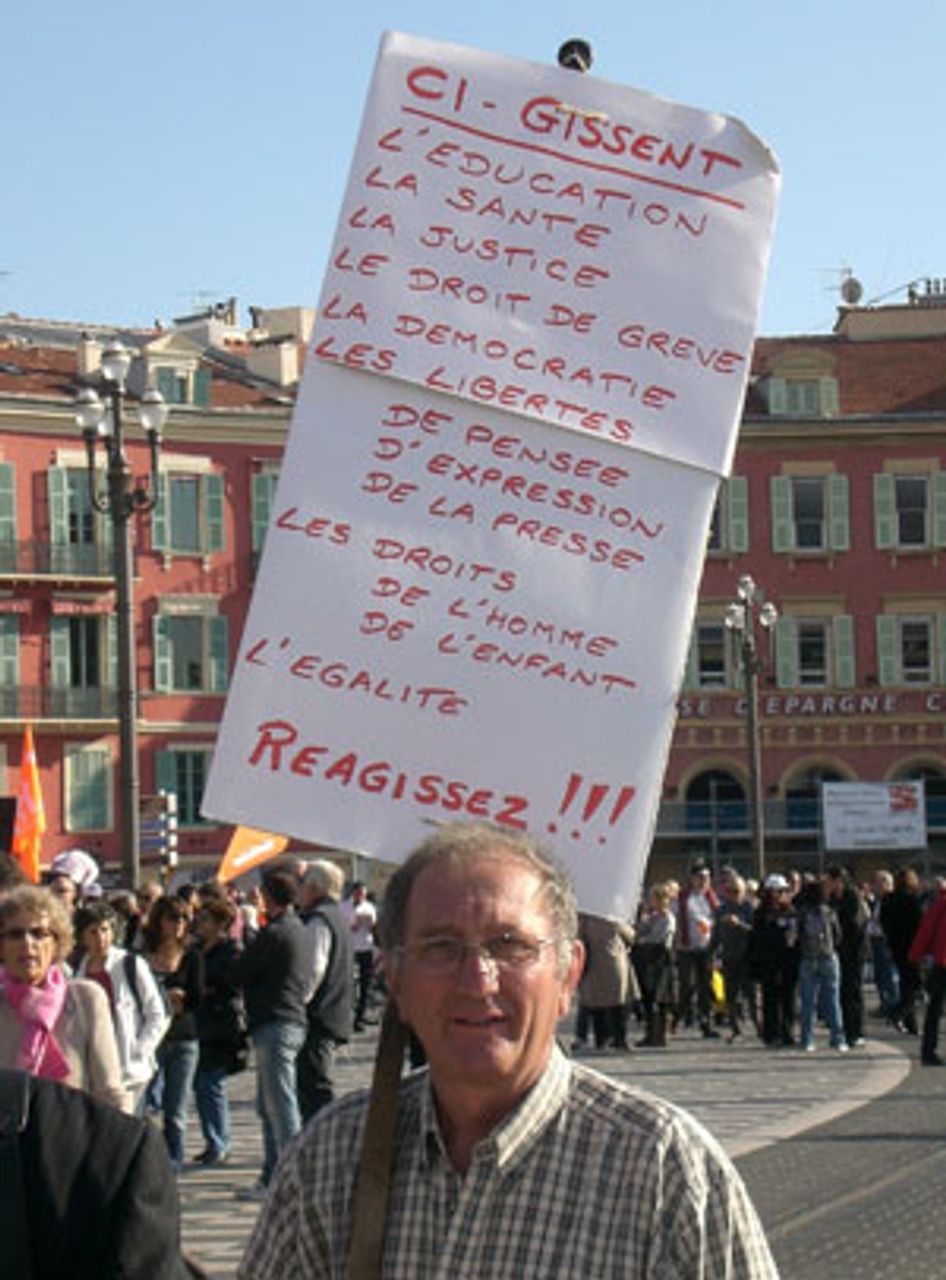 Nice: Placard reads: "Here lies education, health,
Nice: Placard reads: "Here lies education, health,justice,the right to strike, democracy, freedom of
thought, of expression, of the press, the rights of man
and of the child, equality. We must act!!!
As Dominique Paillé, the spokesman of the ruling Union for a Popular Movement (UMP), put it: “If there were to be more industrial action and protests it would be a blow to the duty we have to carry out our obligations so that France can be a leading state in the international arena as soon as we emerge from the crisis.”
Neither the Communist Party aligned General Confederation of Labour (CGT) nor the PS are in fundamental disagreement with this view, but the CGT is reluctant to appear to have thrown in the towel because it fears losing control of continuing actions of sections of workers and high school and university students. In fact, it has played a crucial role in helping Sarkozy since his election in 2007 to impose his austerity measures in order to maintain French big business’s edge. CGT General Secretary Bernard Thibault told the press on Saturday: “We’ll fight till the end, until we get negotiations for other measures for the future of our pensions.... We are going to do everything to prevent these new measures being applied.”
Martine Aubry, first secretary of the PS, who marched at the head of the CGT section of the Paris march with a delegation of party tops, told the media: “We cannot accept it and, to the end, the Socialists will be with the French people and the trade unions.” This is to preserve some credibility for the likely PS candidate in the 2012 presidential elections, Dominique Strauss Kahn, director general of the IMF, despite the fact that he has expressed support for Sarkozy’s pension reform.
Teams of WSWS supporters distributed WSWS articles in Paris, Nice and Amiens.
Despite torrential rain, some 80,000 people marched through Paris in a demonstration led by the union bureaucracy and by the New Anti-Capitalist Party, whose members were hostile to WSWS materials. Nonetheless, the marchers were clearly hostile to the unions’ role in selling out the struggle. One brandished a placard directed at the unions, titled “Don’t let them betray us again.”
Another homemade placard read: “Democracy in the French Republic: intolerance, corruption, the criminality of the politicians and the state institutions.”
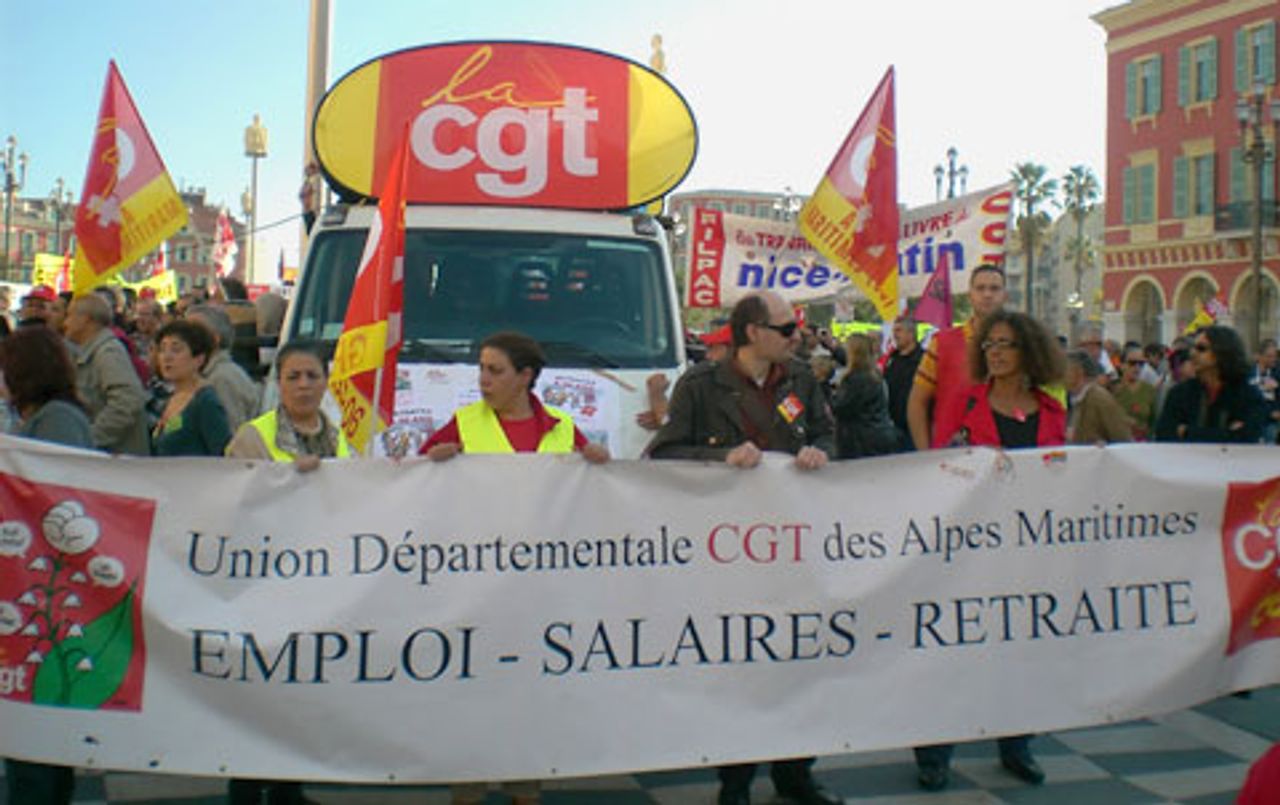 Nice: Banner reads: CGT union of the Alpes-Maritimes department
Nice: Banner reads: CGT union of the Alpes-Maritimes departmentIn Nice, where over 5,000 people demonstrated, there was a very heavy police presence, due to talks being held in the city between Sarkozy and the Chinese president. While the police were also deployed to intimidate the protesters, the weather permitted a freer exchange of views with WSWS reporters than in Paris.
Many were very receptive to the analyses and the perspectives of the WSWS and glad to consider a perspective other than that of voting for a PS government in 2012.
The profound hostility of these sections to Sarkozy was expressed by a group of railway workers, cheered on by some 200 demonstrators, who staged a mock trial in the street of Sarkozy for his crimes against the working class. In a scene reminiscent of the French Revolution and the overthrow of the Ancien Régime, his effigy was guillotined and its head paraded on a pole.
A nonunion factory worker said: “We have to continue the fight against pension reform and we will defeat him in the election of 2012.” He said he thought that the PS would repeal Sarkozy’s legislation, but admitted that he would have to rethink his positions when we informed him of the policies of the party’s main presidential candidate.
Two retired people participating independently expressed support for the building of independent action committees and a break with the unions and the capitalist “left” parties. They were enthusiastic about our policy of uniting all working people in Europe and internationally.
Another demonstrator from outside Nice rejected the unions and the “left” parties, saying he was in opposition to all that Sarkozy was doing. “We are facing war—the deportation of the Roma is like that of the Jews” during World War II, he said.
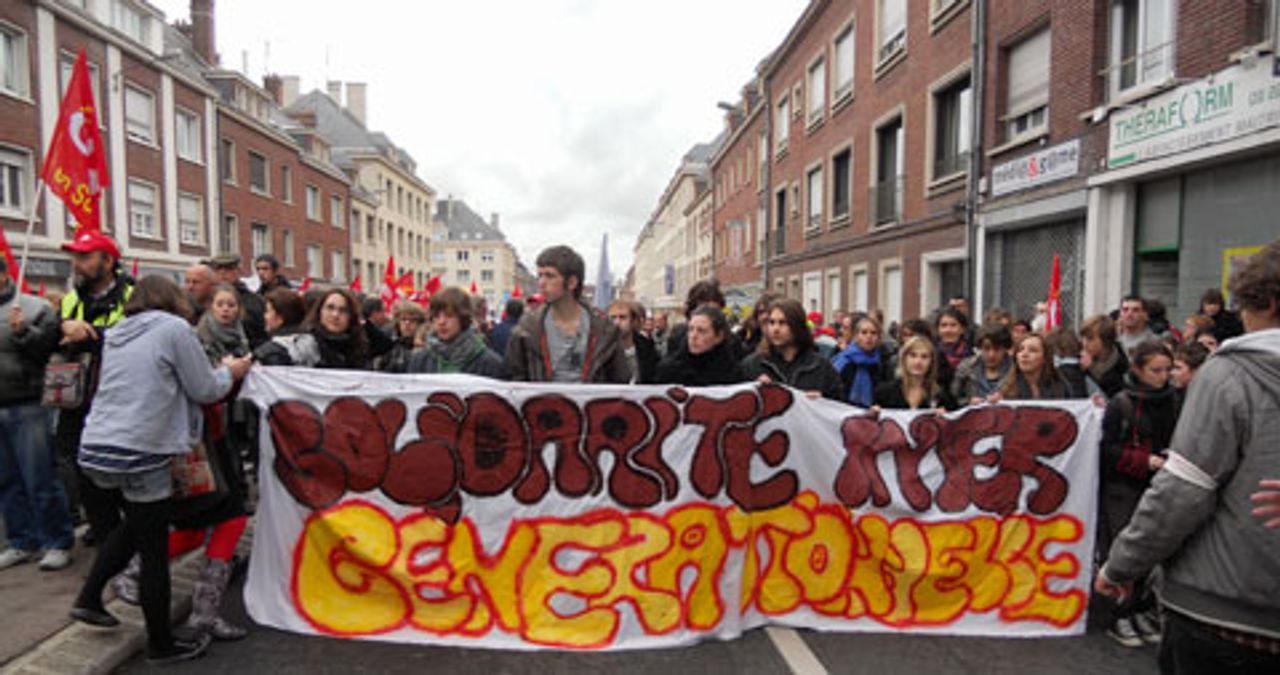 Amiens: The banner reads: "Solidarity between generations"
Amiens: The banner reads: "Solidarity between generations"In the Picardy regional capital of Amiens 3,000 people demonstrated to protest the pension cuts, a much lower response compared to 10,000 the previous week during the holidays. The march through the town was headed by 50 youth organized by the CGT union under a banner calling for “Inter-generational solidarity”. Demonstrators were subdued, though they were determined to express their opposition to the law.
David, a trainee teacher, commented: “Even if the unions envisage spacing out their actions, the youth, they will be there to fill the gap. Our turn has perhaps come to take over the reins”.
Some students present on the demonstration remarked to the WSWS that many of them were dubious about responding to the appeal by the student union UNEF (close to the Socialist Party), as it had betrayed a four-month strike by students in 2008 against the autonomy law for universities.
Moreover, many students resent any association with the Socialist Party and its campaign—under the guise of defending pensions—to replace Sarkozy in the 2012 presidential election. Its current leading candidate, Dominique Strauss-Kahn of the International Monetary Fund, has said that the retirement age is “not a dogma”.
Subscribe to the IWA-RFC Newsletter
Get email updates on workers’ struggles and a global perspective from the International Workers Alliance of Rank-and-File Committees.
